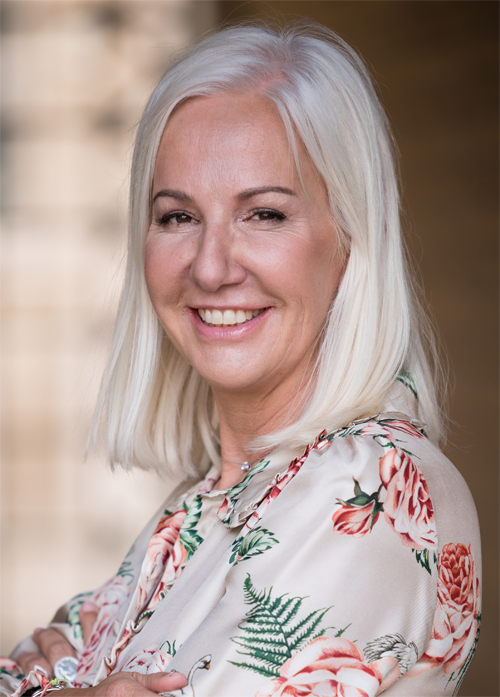
 |
|
| Home Technology / Education Events & News Archives Designs |
|
Putting sustainability
at the heart of
business strategy:
An in-depth interview with
Iris Van der Veken  Iris Van der Veken, Executive Director - RJC How has COVID impacted the sustainability movement? Have you seen a difference in approach by companies in our industry? I have been working in this industry for over 20 years now and I have never seen such a great appetite for sustainability. COVID-19 has significantly impacted every aspect of how we work and live. I think it has really taught us a few lessons. First, responsible business is resilient business, companies that integrated sustainability and transparency strategically into the core of their business operations prior to this crisis have put an even stronger focus on it now. More importantly, such organisations have been much more agile in responding to unexpected events. We saw retailers step up and get creative with their operations, including a renewed focus on digital first. Second, health, safety and wellbeing are now centralised in the resilience and sustainability discussion in a way that has never occurred before. Mental well being is finally coming to the forefront of the sustainability agenda. We saw great leadership from companies who continued to pay their employees in full during the pandemic or gave back through their community response and outreach efforts. Finally, all of us in the global jewellery industry are faced with an opportunity to perform a reset and to redefine our planet’s future by setting more ambitious sustainability goals and shortening the timeframe in which we deliver on them. The 2030 agenda is just around the corner, and we all need to step up to the challenge. Our work with the United Nations Global Compact, ISEAL, World Diamond Council and CIBJO reflects this vision. We work in an industry that regards beauty and human emotions as core values, and hence we have an even bigger responsibility in this area. You are known as probably one of the greatest ambassadorsactivist on sustainability long before the industry was focusing on this. What drives you to continue to raise the bar? If we want to leave behind a healthy planet for the generations to come, I consider it an ethical obligation to do my bit. I feel lucky and privileged to have a professional role where I, along with my wonderful team at RJC, am able to make a direct and tangible impact on furthering the sustainability agenda in our industry. We all know that efforts towards sustainability need to be massively accelerated and that we are running out of time. I came across this quote by Barack Obama, which has the clear ring of truth for me: “We are the first generation to feel the impact of climate change and the last generation that can do something about it.” I have always been passionate about this work. Through my work on the ground in many countries including India, Thailand and Sri-Lanka, I have seen first-hand what happens when leaders have strong core values. It has a positive ripple effect on their business strategy, operations and reaches deep into the lives and livelihoods of many people in the community. My personal philosophy is that sustainability is not about philanthropy. To achieve truly transformative change, companies must integrate a more strategic and proactive approach to social impact into every aspect of their business. In other words, how you treat your employees and suppliers, how you measure your carbon impact, how you design your supply chains and products are all deeply linked parts of the sustainability journey for an organisation.
Responsible business is here to stay. Increasingly, we see that businesses that are not committed to embedding sustainability at the core of their business practices are realising that to do so is to risk consumer confidence as well as profitability. Fortunately, there is an abundance of ESG research demonstrating that the companies that embrace long-term, multi-stakeholder models perform much better, as it helps them to earn their license to operate, reduce risks and costs, attract and retain top talent, access new markets, accelerate innovations, and partner with key stakeholders to affect system-level transformation. Investing in sustainability is not only a risk and cost management tool; it can also drive innovation. Recognizing the growing consumer interest in sustainable products and looking to solve consumer challenges, best-inclass companies in all industries including ours are leading the charge and accelerating the pace at which the rest of the industry embraces change. How will the consumer have an impact on the sustainability agenda? Sustainability will play an increasingly important role in consumer buying decisions. Purchases of fine jewellery that are influenced by sustainability are forecast to more than triple in the years ahead, presenting an opportunity for the industry to learn from its history and make positive change. The consumer is in the driver’s seat, and it is a race car! Fine jewellery purchases influenced by sustainability considerations are poised for dramatic growth. By 2025, an estimated 20 to 30 percent of global fine jewellery sales will be influenced by sustainability considerations from environmental impact to ethical sourcing practices. But leaders in a previously slow to act industry must look beyond sustainability as merely a factor in risk mitigation and embrace it as an opportunity to build brand equity by pursuing responsible business practices. The State of Fashion: Watches and Jewellery Report — Bringing the Sparkle Back | BoF (businessoffashion.com) How do you define CSR? CSR is a voluntary action by businesses to take responsibility for the impact of their activities on society and the environment - going beyond legal compliance. It allows businesses to be socially accountable to their stakeholders and the public and to engender that most precious and fragile of values - consumer trust. In the past, having a CSR intention and a “do no harm” approach were often enough. Today, consumer expectations and corporate values have moved to a “do good” mantra. Corporate social responsibility isn’t just about building reputations, it’s about building businesses that matter. It involves building a true culture of consistently responsible business practices that is reflected in the end-to-end supply chain. In other words, sustainability is a way of describing how companies measure and control their impact on society. This includes a company's contributions – both negative and positive - to the economy, environment, and greater community. Personally, my definition is that sustainability is about human dignity for all. That brings me to the SDGS - how do the 17 Sustainable Development Goals fit in the sustainability journey of a company? The 17 Sustainable Development Goals are a roadmap for humanity. In September 2015, all 193 Member States of the United Nations adopted a plan for achieving a better future for all - laying out a path to end extreme poverty, fight inequality and injustice, and protect our planet, over the next 15 years. At the heart of “Agenda 2030” are the 17 Sustainable Development Goals (SDGs) which clearly outline the world we want — applying to all nations and leaving no one behind. For the first time, the global Sustainable Development Goals (SDGs) recognise the key role of business and the finance community in achieving these ambitious targets, which aim to alleviate poverty, advance equality and protect the environment. Companies across industries, no matter how large or small, can and should contribute to the SDGs. While the scale and scope of the global goals is unprecedented, the fundamental ways that businesses can contribute remain unchanged. Over the next 9 years, with these new goals that universally apply to all, the Responsible Jewellery Council - as the leading standards organisation for our industry - is committed to be the catalyst of that transformation. We do this through the implementation of the Code of Practices and reporting on progress on the SDGs by its member companies and the jewellery industry as a whole. The SDGs can only be realized with strong multistakeholder global partnerships and cooperation. Coordinating efforts to drive positive impact towards the 2030 agenda by sharing knowledge to businesses across the value chain from mining to retail is mission critical and we are working closely with CIBJO and the World Diamond Council to succeed. How to implement sustainability? The foremost requirement is a clear and ongoing commitment to centralising sustainability in the business strategy of a company. Success requires both a structured program and a strong leadership commitment to embed sustainability into the DNA of your company.
Some key steps along this journey are • Benchmark and gap analysis How can RJC help? RJC is the world’s leading standard-setting organisation for the entire jewellery and watch industry. Today, RJC helps over 1,450 member companies across 71 countries to embed sustainability into their core processes. 60% of our members are small enterprises. In order to help organisations, create and implement a CSR strategy, RJC has launched this Toolkit for SMEs. https://responsiblejewellery.com/wpcontent/ uploads/RJC-SME-Toolkit-June-2021.pdf. The RJC Code of Practices provides a comprehensive framework of standards covering the entire supply chain from mining to retail, and applies to diamonds, gold, silver, coloured gemstones, and platinum group metals. All RJC member companies must be independently audited for compliance with the COP. Now, as ever, the only certainty in business is uncertainty, as the world quickly discovered in the wake of the COVID-19 outbreak that fundamentally altered the world’s economy and the lives of people all over the globe. True corporate responsibility requires a plan to address your company’s approach to not only current hot button issues, but the challenges, both visible and yet to be encountered, that lie on and beyond the horizon.
|